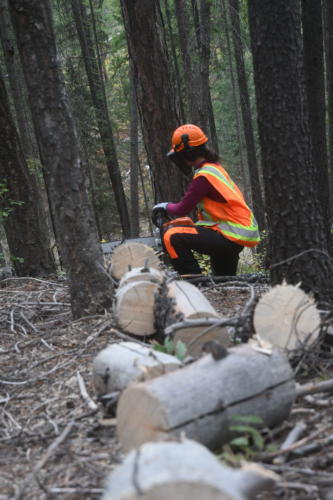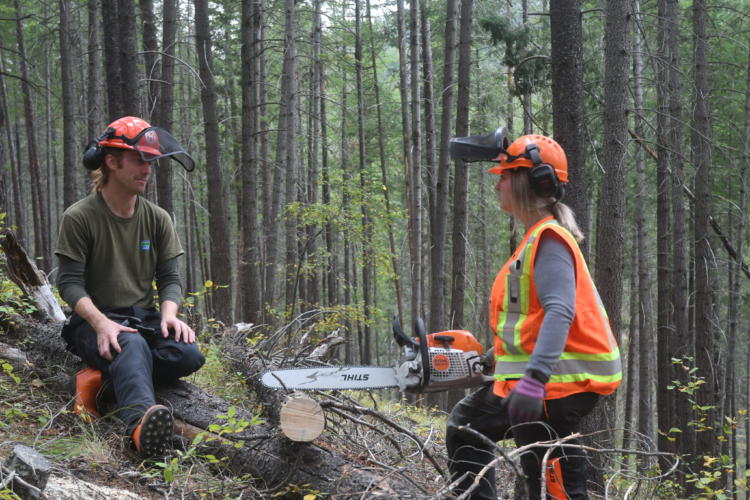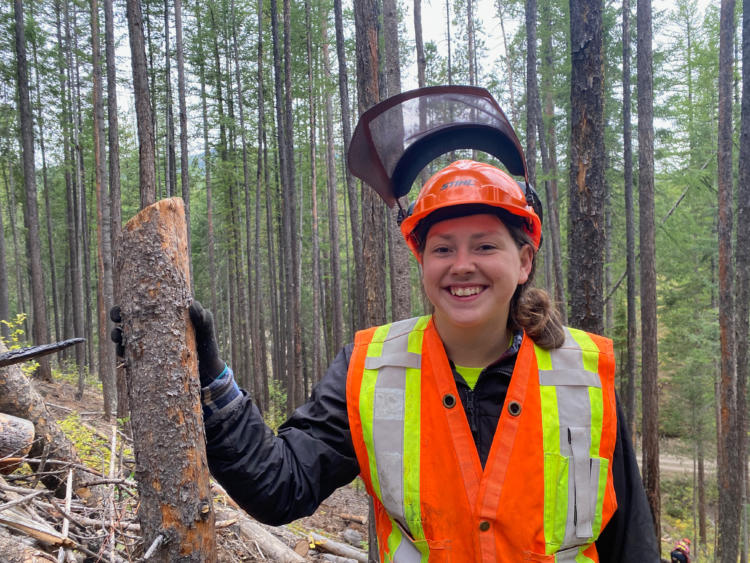Wildsight’s Youth Climate Corps (YCC) Kimberley/Cranbrook crew is spending the last few weeks of their contract working in Kimberley’s backyard jewel. At 840 hectares, the Kimberley Nature Park is B.C.’s largest municipal park, home to many species of plants and animals, and featuring more than 50 km of trails for non-motorized summer and winter use.
On a drizzly Thursday morning, the buzz of chainsaws fills the air. Bright orange vests dot the steep wooded slope; passersby pause to watch before continuing on their morning stroll as the crew slowly works their way across the hillside.
“The Youth Climate Corps is working in an area that has already had some treatment by contractors,” explains Kent Goodwin, Kimberley city councillor and member of the Kimberley Nature Park Society. “But there’s been a bunch of blowdown, and there are trees lying on the ground in greater numbers than our fire ecologist (Bob Gray) is comfortable with so close to town.”

Historically, low and moderate intensity fires would have passed over the landscape in an irregular fashion. Consuming debris, young trees, and in some cases entire areas of forest, with the result being a mosaic of forest cover types. But fire suppression has been the go-to response for so long now that we have many homogenous and overstocked forest landscapes that are less resistant to fire and pose significant wildfire risk, particularly when adjacent to communities. Research on the mountain pine beetle also points to wildfire suppression as a primary cause of the beetle’s destructive spread. What many see as a ‘normal-looking’ forest is a tinderbox ready to burst from the slightest ember.
“We want to break up the continuity of fuel, so that if a fire were to start somewhere, it would have a difficult time travelling along the ground and a near impossible time getting into the canopy,” explains Tim Chapman, YCC Kimberley/Cranbrook coordinator.
“This is not what a forest should look like,” asserts crew member Kaite Martin. “When it looks like this, if a fire were to come, it could destroy the entire forest, instead of just clearing it up. Because of human impact, because we’ve prevented the natural way of things, we now have to go in and do some sort of restoration; we have to clean up the forest, especially near our towns.”
This project helps the community to meet FireSmart principles, as the YCC crew works to reduce wildfire risks near residential areas. The City of Kimberley and the Kimberley Nature Park both supported this valuable YCC project, which will treat approximately three hectares of the park.
Dave Hale, Kimberley Nature Park Society director, explains that while this is a relatively small project compared to some of the extensive ones underway elsewhere, it all adds up to helping protect this valuable local space, and the community alongside it, from wildfire threats.
“It’s cool that youth are doing that work, and that Wildsight is involved,” says Dave. “It’s small, but influential.”
The City of Kimberley also wrote a letter of support for the project.

“We are encouraged to see that Wildsight’s Youth Climate Corps, in partnership with Bob Gray, will be proposing further wildfire fuel mitigation efforts in our Nature Park. Not only will these efforts enhance the ongoing work done by the City to make our Nature Park a safe and resilient forest for decades to come, it will provide immediate employment, community led solutions and skills development for those involved in the project.”
It’s a challenging work environment for the young crew, but one they have enjoyed tackling.
“I’d never really done anything like this before, so it was really scary for me, but I feel proud of myself,” says Ivy Desboilles. “I had a few mishaps at the beginning but I’m learning from my mistakes. I’m feeling stronger. And I guess I’m more confident in myself as well.”
Wildsight’s Youth Climate Corps provides meaningful employment and training opportunities for young adults, with tangible climate action projects as our main focus. This year’s Kimberley/Cranbrook crew undertook projects on food security, ecosystem restoration, water quality, community education, and several wildfire mitigation efforts.
The Kimberley Wildfire Resilience Demonstration Project is made possible with support from Columbia Basin Trust and the Province of BC, along with other supporters of Wildsight’s Youth Climate Corps Program.








